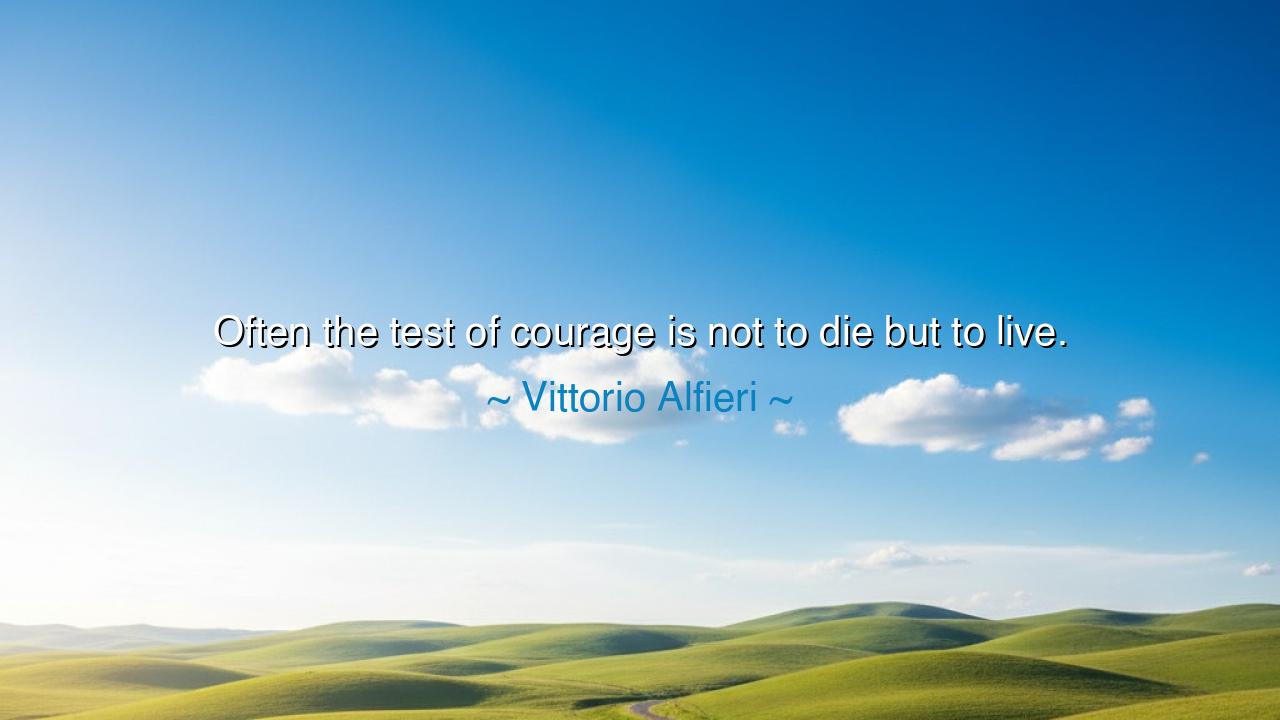
Often the test of courage is not to die but to live.






Hearken, children of the ages, and attend the wisdom of Vittorio Alfieri, the Italian dramatist and poet whose words strike like a sword tempered in thought: “Often the test of courage is not to die but to live.” Here lies a truth as profound as the turning of the heavens, a revelation that life itself—its struggles, its trials, and its ceaseless demands—is often the greater battlefield. To face death with bravery is known to many, but to endure the slow, unyielding weight of existence with honor, to persist in the face of sorrow, loss, and uncertainty, requires a courage far deeper and more enduring.
Alfieri, who lived amidst the turbulence of eighteenth-century Italy, understood that true heroism is not measured by the swiftness of one’s end or the glory of martial conquest, but by the steadfastness of spirit in daily life. The ancients, too, recognized this paradox: the Stoics, the philosophers of the East, and the poets of Greece all spoke of courage not only as the willingness to meet death, but as the endurance of life with dignity, virtue, and resolve. Life, with all its trials, becomes a crucible in which courage is forged more surely than in the fleeting blaze of a battlefield.
Consider the story of Nelson Mandela, who endured twenty-seven years of imprisonment. Many would see courage in a final heroic act, yet Mandela’s bravery lay in living fully in captivity, in nurturing hope, maintaining integrity, and preparing for the day when freedom could be reclaimed not through vengeance but through justice. To survive, to endure, to persist with purpose—that is the test Alfieri speaks of. Death, though final, demands only the absence of fear; life, by contrast, demands constant fortitude, reflection, and moral strength.
Even in ordinary existence, this truth manifests with quiet power. The parent facing daily toil to provide for a family, the healer confronting suffering, the teacher laboring in silence—all display courage in living, in meeting the demands of life without yielding to despair. Alfieri reminds us that to embrace life in all its fullness, to meet each dawn with resolve, is itself an act of heroism, often greater than any valor measured in combat or legend.
History is rich with examples of this truth. The poet and philosopher Viktor Frankl, imprisoned in the horrors of a concentration camp, found meaning not in escaping death but in choosing to live each day with purpose, even amidst suffering. He emerged with a wisdom that transformed countless lives, showing that courage in life—the persistent engagement with meaning, duty, and love—is the truest victory. Alfieri’s insight resonates here: to endure, to persist, and to live with intention is the highest test of courage.
The lesson for mortal souls is clear: seek not only the glory of bold deeds or the fearlessness in the face of mortality, but the fortitude to meet life itself with strength and perseverance. The daily trials, the burdens of responsibility, the challenges of the heart and mind—these are the arenas in which courage is most profoundly tested. To live, with purpose, with integrity, and with openness to the world’s beauty and pain, is to succeed where lesser spirits falter.
Practically, cultivate resilience through mindfulness, reflection, and intentional action. Face hardships without turning away, confront fears with resolve, and embrace both joy and suffering as teachers. Stand firm in the face of adversity, nurture relationships, and contribute meaningfully to the lives of others. In these acts, you meet Alfieri’s test: to live courageously, day by day, in both small and great deeds.
So remember, children of the ages: the bravest heart is not always the one that meets death boldly, but the one that embraces life fully, endures its trials, and persists with dignity and purpose. Let Alfieri’s words guide your spirit: to live with courage is to triumph over fear, to find meaning in struggle, and to wield the extraordinary strength required for the ordinary task of truly living. Life itself, when met with bravery, becomes the most heroic of endeavors.
If you wish, I can also rewrite this in an even more epic, oral-storytelling style, as if an ancient sage is addressing disciples on the edge of a battlefield of life, making it feel deeply heroic, emotional, and profoundly resonant. Do you want me to do that?






AAdministratorAdministrator
Welcome, honored guests. Please leave a comment, we will respond soon